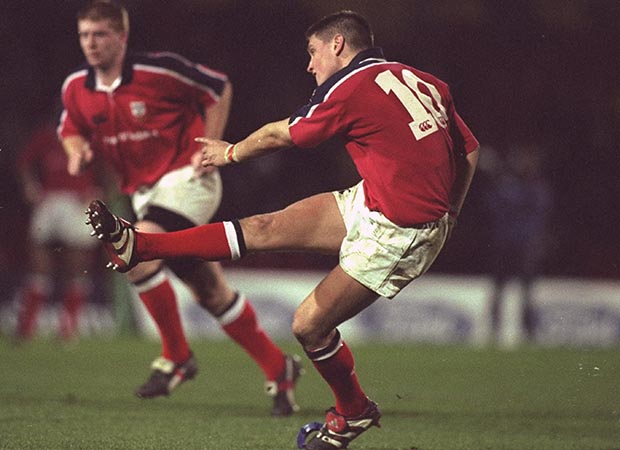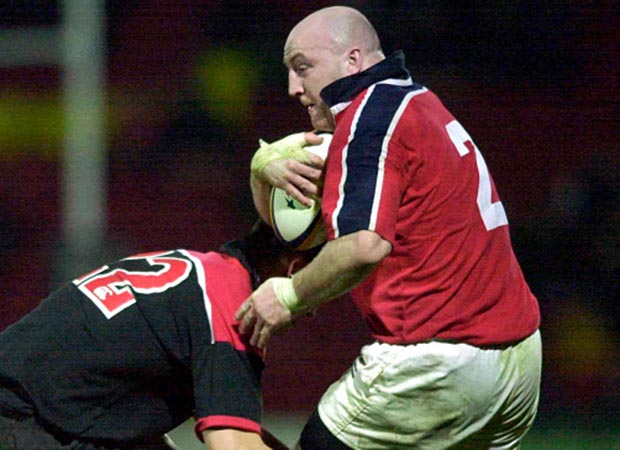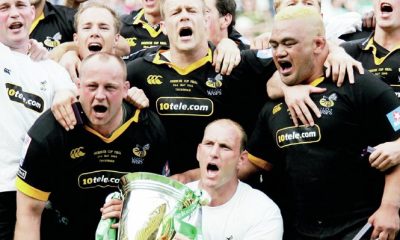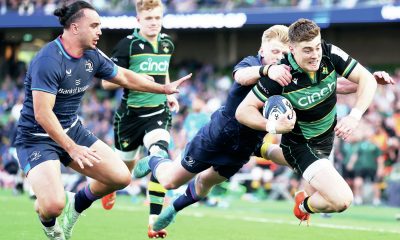
 It’s 18 years since Saracens first met Munster in Europe in a double header that still ranks alongside any clash in the competition’s illustrious history. In two matches either side of Christmas Munster won 35-34 with the last kick of the game at Vicarage Road and 31-30 – again with the last kick of the match – at Thomond Park.
It’s 18 years since Saracens first met Munster in Europe in a double header that still ranks alongside any clash in the competition’s illustrious history. In two matches either side of Christmas Munster won 35-34 with the last kick of the game at Vicarage Road and 31-30 – again with the last kick of the match – at Thomond Park.
For Munster it was the launching pad for their glory years in Europe in which they became perennial contenders. This was the brace of matches that truly established their European tradition. In the next 14 seasons they reached the knock-out stages on 13 occasions.
For Saracens, at the forefront of the drive to proper professionalism in England, it was a huge missed opportunity and setback as well as an eye opener and perhaps something of a wakeup call. They weren’t to reach the knock-out stages of the Heineken Cup for another eight years but the lessons learned stayed with them and, I would argue, underpin, their modern day success story.
Small margins. There are those who will tell you to this day that Ronan O’Gara’s last minute kick at Watford was marginally wide. His clincher at Thomond also looked like it was drifting wide until at the last moment it came in on the wind and shaved the inside of the posts.
To set the scene a little the two matches came in the wake of a 1999 World Cup which had not seen British rugby at its best, indeed only France flew the flag for Europe with any conviction. The sport in these shores was feeling a tad sorry for itself despite all the hype and excitement of the World Cup and needed a boost. The European Cup that year certainly provided that.
The first match saw Saracens seemingly take control with two first half tries before Munster staged one of their soon-to-become familiar second half surges to briefly take the lead. Sarries hit back with a third try, Thierry Lacroix and a very young Ronan O’Gara swapped a load of penalties but Munster finished strongest with tries from Anthony Foley and Jeremy Staunton before Rog administered the killer blow.
As Saracens captain Francois Peinaar said: “There was one team that came out to play in the second half, and one that stayed in the dressing-room. We were the team in the dressing- room.”
Keith Wood was playing for Munster on a year’s sabbatical from Harlequins that season – it’s difficult to envisage such civilised gentlemen’s agreements being enacted these days – and has his own vivid memories of both matches.
“For starters I will never ever forget the team meeting we had back in Limerick that week of the game at Vicarage Road. Declan Kidney got us all into the room and then put on a Fez hat and started putting up the pictures and clips on the screen with his powerpoint or whatever it was in those days.
“After a few rugby shots there were suddenly pictures of all these dancing girls wearing not a huge amount of cloths and cheerleaders doing their stuff. ‘You’d better get used to all this, it’s coming your way on Saturday’, said Deccie. Of all people! Then he went back to the rugby stuff. It made the point very well in fairness.
“Munster were a slightly odd team around this era. We had a decent old gnarly pack right enough that was going to make us competitive, but in the backs but we had absolutely no gas whatsoever other than a few bursts from Anthony Horgan. What we did have was really good footballers everywhere – Eammon Holland, Killian Keane, Jeremy Staunton, Dominic Crotty, John Kelly and others.
“And, of course, we also had two completely untired, untested, uncapped and unafraid pups at half-back in Rog and Peter Stringer. At the start of that European campaign we had no real idea of the extraordinary players they were to become. We certainly had a pretty good idea by the end though.
“That double header seemed like the start of something, then and now. Munster fans had begun to travel for the European games even though success had been limited, but it’s fair to say that the trip to Vicarage Road was lift-off in that respect. Not only did they travel over from Munster but the game ignited the Munster diaspora in England. They got behind us as well and continued to augment the Red Army in big games. Everything began to snowball after that.”
 The return match was much anticipated to say the least. Thomond didn’t quite have the cache for European fans then as it does now but Wasps had come back with their tails between their legs a couple of seasons earlier after a 49-22 spanking. The old ground had made the headlines in the autumn when it proved a brilliant atmospheric venue for Australia‘s World Cup game against the USA.
The return match was much anticipated to say the least. Thomond didn’t quite have the cache for European fans then as it does now but Wasps had come back with their tails between their legs a couple of seasons earlier after a 49-22 spanking. The old ground had made the headlines in the autumn when it proved a brilliant atmospheric venue for Australia‘s World Cup game against the USA.
On the day Saracens turned up determined to play an expansive game and Mark Mapletoft, enjoying his best game for the club, scored two tries and Darragh O’Mahony added another. But Munster were on a mission and with O’Gara again pulling the strings and kicking his goals after half time while Jason Holland added a try to Galway’s earlier effort.
At the death it all got very frantic with a 71st minute Mapeltoft try tilting the game Saracens way again but the day was far from done.
“We could easily have lost and I would never have forgiven myself because I nearly blew it for Munster,” recalls Wood. “It was me who stepped up too quick from the defensive line and let Toftie in for a try under the posts which put them six points clear. I remember to this day Micky Galwey gathering us under the post and very slowly and very deliberately telling us what was going to happen next.
“We were going to win the ball from the restart and force a penalty. We would kick for touch win the line out, move forward and win another penalty, then we would go for another line-out and rumble it over for a try. It took a bit of time to get organised, it didn’t happen straight from the restart, but in essence that is exactly what we did in the final passage of play and I was very relieved to be the try scorer.
“But we still needed Rog to kick the conversion, on the left, 10-15 yards from touch with a strong wind right to left. Had I known then what I know now I would never have doubted him for a second – no better man – but he hadn’t even played for Ireland at this stage. He nailed it, judging the wind perfectly.
“I might be wrong but my memory is that was the first time they put Stand up and fight on the loudspeaker and we had a good old rendition of it out on the pitch afterwards. Our manager Brian O’Brien had certainly been teaching us it that week.
“That match at Thomond was one of the best games of rugby I ever played in. It was a humdinger, very high quality. The build-up was amazing, the first European match I can remember that felt almost as a big as a Test.
“Saracens were coming with their full stat studded team looking for revenge and surely lightening wouldn’t strike twice. This time Munster were going to get their come tuppence surely. Well it didn’t work out like that but I have to concede they played incredibly well. You don’t often play that well and lose.”
Down in the tunnel your correspondent recalls bumping into Nigel Wray straight after the match and pulling him over for a word expecting all sorts of bitter pangs of regret as we listened to yet another chorus of Stand up and Fight outside. He was disappointed alright but Wray is a dignfied loser and that evening his eyes were also ablaze with messianic fervour.
If not exactly a Damascus moment – that had surely come five years earlier when he made his initial financial commitment to Saracens – the Thomond experience was a timely re-affirmation for Wray of the potential of club rugby he had already invested in so generously
“Look at, this it’s incredible,” he kept saying shaking his head in wonder as he pointed in the direction of the massed ranks outside still singing. “This is what we can build with a club structure in Britain and Europe, we can have days like this every season. We need to build a passion for the club and a connection with the community like this at Saracens. I am just so impressed with everything I’ve seen here at Munster today. This is the future.”
It took a while for Wray’s dream to come true and there were plenty of bumps in the road but when Saracens finally landed the European Cup last season one of the first thoughts that flashed through my mind was that snatched conversation with Wray at Thomond Park. Saracens are, of course, their own team and club, with their own individual traits, but to these eyes there are huge dollops of Munster in their make-up as well.
Imitation remains the sincerest compliment of all.
There wasn’t quite the fairy-tale ending to that season for Munster that such a triumph seemed to demand. They dealt with the formidable challenge of Stade Francais in the quarter-final at Thomond and recorded an historic win over mighty Toulouse in Bordeaux in the semi-final but come the final itself – when the Red Army has swelled to an estimated 40,000 strong at Twickenham – the magic ran out and Northampton squeezed home. The genie was out of the bottle though and Munster have never been the same since.


Champions Cup
Bordeaux Begles accused of Henry Pollock vendetta

English Championship
Ryan Lamb support for Championship changes
Latest News
Great Britain to cut its sevens project

Latest News
Call for concussion protocols to be revised
























You must be logged in to post a comment Login